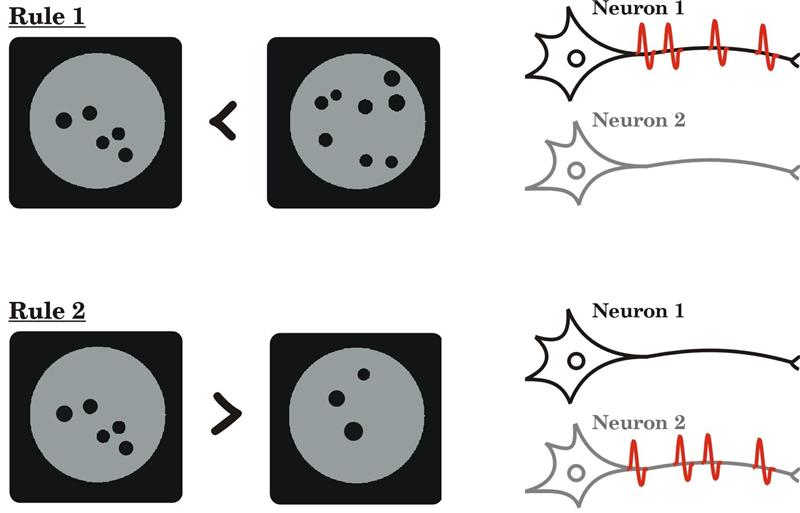Neurobiologists in the laboratory of Andreas Nieder at the University of Tübingen writing in Proceedings of the National Academy of Sciences (PNAS) (January 18.-24. 2010) say they have shown for the first time how brain cells process simple mathematical rules.
Humans are unrivalled in our understanding of numbers and rules but the foundations of such high-level skills can already be found in the animal kingdom. The scientists at the Institute of Neurobiology in Tübingen trained rhesus monkeys to compare set sizes (numerosities) and to switch flexibly between two abstract mathematical rules. The 'greater than' rule required the monkeys to release a lever if the first test display showed more dots than the sample display, whereas the 'less than' rule required a lever release if the number of items in the test display was smaller compared to the first test display.

Specific brain cells represent abstact rules and generate action potentials either for the "less than" or "greater than" rule. Credit: University of Tübingen
The monkeys learned the quantitative 'greater than/less than' rule and were able to choose the smaller or greater set size relative to the sample numerosity, independently of the absolute numerosity of the displays. While the animals were performing this task, neurons recorded in the prefrontal cortex of the frontal lobe exhibited interesting activity.
Irrespective of the absolute magnitude of the dot sets, the brain cells exclusively represented the mathematical rule at hand. Approximately one half of these neurons were only active whenever the animal followed the 'greater than' rule, whereas the other half preferred the 'less than' rule.
They say this new study provides insight into the neurobiological foundations of highly abstract thinking that is necessary for mathematical operations.
“First of all we want to understand how neurons process mathematical operations,” said Andreas Nieder. “At the same time, our investigations of the number sense are meaningful for assessing the very complex thinking processes that are necessary, for instance, when dealing with numbers.”
It is the cerebral cortex at the frontal pole of the brain that constitutes the brain’s highest cognitive control center. This region of the brain also gives rise to mental activities that build personality. Damage to the frontal lobe (e.g. after injuries or stroke) disturb goal-directed logical thinking and reasoning. The new study provides important clues to how the healthy brain obeys abstract mathematical rules, which in turn will help to elucidate and treat related mental illnesses.
CItation: Sylvia Bongard and Andreas Nieder: Basic mathematical rules are encoded by primate pre-frontal cortex neurons. PNAS, Online Early Edition, Januar 18.-24., 2010. http://www.pnas.org/content/early/recent






Comments